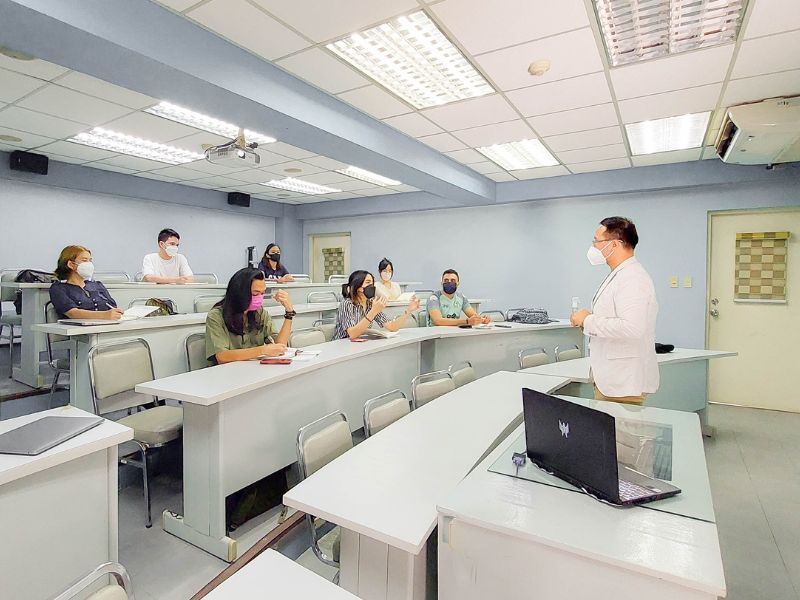
The VCAR issued through a memo the learning modes to be observed in classes for the second semester, academic year 2022-2023. Everyone is enjoined to read closely the memo and the accompanying Matrix of Subjects.
Mode 1: TRADITIONAL BLENDED LEARNING
The Traditional Blended Learning Mode is 50% Onsite and 50% Asynchronous. This means that there will be two (2) sessions every week; one is Onsite and the other is Asynchronous. The Certificates of Registration (CORs) of students enrolled in classes observing this learning mode reflect schedules as shown below.
Example:B-BMKM312 Mon BBA202
B-BMKM312 Th ASYNCHRONOUS
Mode 2: Flex Blended Learning Mode
Online classes (Synchronous and Asynchronous) and Onsite Week (one week per grading term) make up the Flex Blended Learning Mode. The CORs of students enrolled in classes observing this learning mode reflect schedules as shown below.
Example:G-ENGL101, TF, TBA
Teachers of subjects observing Flex Blended Learning Mode will notify their respective students of their Onsite Week schedule. Furthermore, during the Onsite Week, all subjects enrolled in by First Year and Second Year Students following the Traditional Blended Learning Mode will be Asynchronous. Meanwhile, Third, Fourth, and Fifth Year Students will be Online.
Mode 3: Onsite Learning
The majority of the Laboratory Classes will go fully onsite. However, Laboratory Classes of Accountancy Students differ. For the subject Business Analytics, its laboratory component is cloud-based. The Seminar on Systems, Applications, and Products (SAP) is Fully Online. On the other hand, all Physical Education Classes will go Fully Onsite.
Please refer to the Matrix of Subjects and the corresponding learning modes. The matrix is accompanied by a listing of General Education, Institutional, Government-mandated, and Professional and Major Subjects for further guidance.
| Subject | Traditional | Flex Blended | Onsite |
|---|---|---|---|
| I. Professional and Major Subjects for Third, Fourth, and Fifth Year Students | ✓ | ||
| II. General Education Subjects for Third, Fourth, and Fifth Year Students | ✓ | ||
| III. Institutional Subjects for Third, Fourth, and Fifth Year Students | ✓ | ||
| IV. Professional and Major Subjects for First Year and Second Year Students | ✓ | ||
| V. General Education Subjects for First Year and Second Year Students | ✓ | ||
| VI. Institutional Subjects for First Year and Second Year Students | ✓ | ||
| VII. Government-mandated Subject for First Year Students | ✓ | ||
| Majority of Laboratory Subjects regardless of year level of student | ✓ | ||
| All Physical Education Subjects regardless of year level of student | ✓ |
Professional and Major Subjects are subjects required of SELECTED First Year and Second Year Students. Depending on the degree these students are specializing in, their list of subjects may include (but not limited to)
Accounting Concepts, Theories, and Principles, Intermediate Accounting, Economic Development, Accounting Information Systems, Business Laws and Regulations, Business Taxation, Cost Accounting and Control, Strategic Cost Management, Governance, Business Ethics, Risk Management and Internal Control, Financial Management
Human Resource Management, Essentials in Marketing, Integrated Marketing Communication, Fundamentals of Analytics, Consumer Behavior and Market Insighting, Good Governance and CSR, Operations Management, Total Quality Management, Fundamentals of Business Analytics, Basic Microeconomics, Business Law, Taxation Category
Fundamental of Criminal Investigation, Law Enforcement Operations and Planning with Crime Mapping, Comparative Models in Policing, Specialized Crime Investigation 2, Therapeutic Non- Institutional Corrections, Character Formation 2, Human Rights Education, Criminal Law
Visual Communication, Communication, Culture, and Society, Journalism Principles and Practices, Advertising Principles and Practices, Public Relations Principles and Practices, Communication Research, Philippine Popular Culture
Philosophy of Law, Philippine Political Parties, Movements, and Interest Groups, Philippine Local Government and Administration, Philippine Parliamentary Practices and Procedures, Philippine Indigenous Communities, Gender and Society, World Geography, Development Economics, Latin American Countries, International Organizations, International Law, Basic French
Micro Perspectives of Tourism and Hospitality, Asia-Pacific Tourism, Geography, And Culture, Professional Image, Tourism and Hospitality Marketing, Legal Aspects In Tourism and Hospitality, Introduction to Event Management, Sustainable Tourism, Information Technology in Tourism, Multicultural Diversity in Tourism Profession, Career Pathing and Public Relations, Fundamentals in Food Service Operations, Risk Management in Hospitality Industry, Foreign Language, Hospitality Research, Nutrition and Wellness, Philippine Tourism, Geography, and Culture
Entrepreneurial Mindset and Behavior, Management Concepts, Theories, and Principles, Business Opportunities, Food Safety and Sanitation, Business Opportunities 1 and 2, Entrepreneurial Marketing 1, Fundamentals of Food, Total Quality Management, Basic Microeconomics, Entrepreneurial Marketing 2, Social Entrepreneurship, Product Costing and Market Pricing, Culinary Nutrition, Business Law for MSMEs, Introduction to Crop Production, Microeconomic Theory, Essentials of Marketing
Business Math, Quantitative Methods, Networking 1, Intermediate Programming, Information Management, Application Development and Emerging Technologies, Object-oriented Programming, Discrete Structures 2
